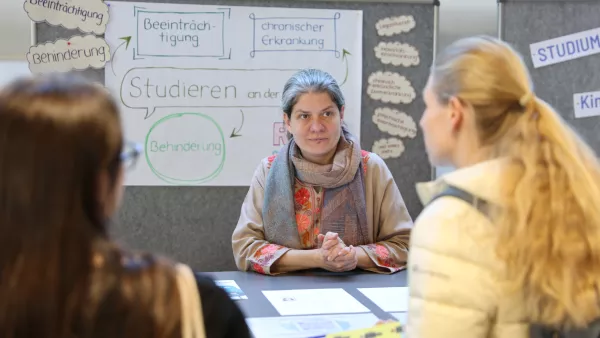General
Studying with a disability or chronic illness
Starting a degree course, discovering a new city, familiarizing yourself with unfamiliar subject matter and passing exams are all challenges that all students have to face at the beginning. If you live with a disability or chronic illness, there are often additional hurdles to overcome. In addition to everyday student life, there are all kinds of barriers to overcome and special organizational and personal challenges to overcome.
Studying successfully with support
We offer information, support and advice so that you can shape your studies as independently and equally as possible: from preparing for your studies to graduation. However, there are also numerous external advice centers that you can contact directly
FAQ on studying with a disability or chronic illness
FAQ before your studies
FAQ during your studies
FAQs on the end of your studies
External advice centers
Glossary
Autism spectrum disorder (ASD)

Studying with autism spectrum disorder (ASD)
Going to university is a significant step and comes with its own challenges when you have an autism spectrum disorder. Overstimulation, social insecurities or difficulties with self-organization can make studying even more difficult. At the same time, students with ASD often have special abilities, such as a high level of attention to detail, perseverance or a pronounced special interest.
Unsure whether you can benefit from our support services? The following statements will help you to better assess this:
- I find it difficult to structure extensive work assignments into sub-goals and work through them in sequence.
- I generally find it difficult to plan things and foresee consequences.
- I am afraid of having to give oral presentations.
- I have problems concentrating in unfamiliar surroundings and/or large rooms (lecture halls!).
- I find it difficult to listen and take notes at the same time.
- I am easily distracted by external stimuli.
- I can't recognize the intentions and moods of others from their facial expressions and gestures.
- It is very stressful for me to get in contact with others or to join a group - I often don't know how to behave in social situations.
- I find it difficult to get help - I don't know who to turn to.
If you can answer "yes" to several of these statements, but would still like to study with us, then you should take advantage of our specialized peer mentoring program , which is tailored precisely to these situations.
Contact & People
Representative for the interests of students with disabilities or chronic illnesses

- Gebäude A
- Room A 112
Responsible for the peer mentoring program for students with autism spectrum disorder

Equal Opportunities Officer

Central Student Advisory Office

